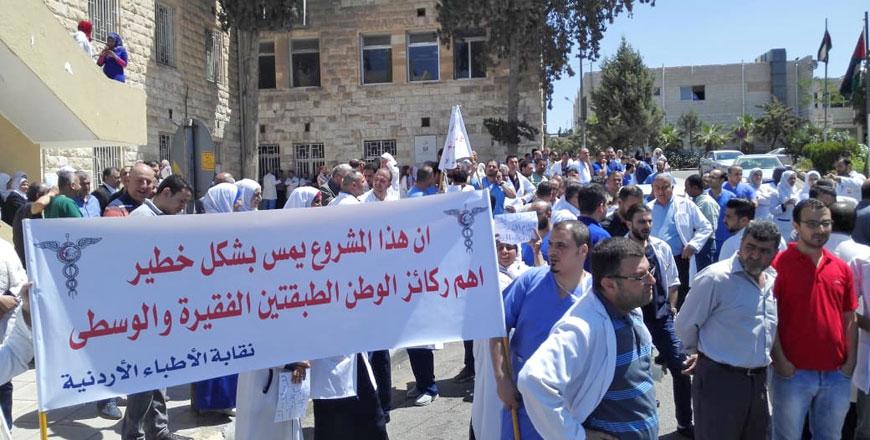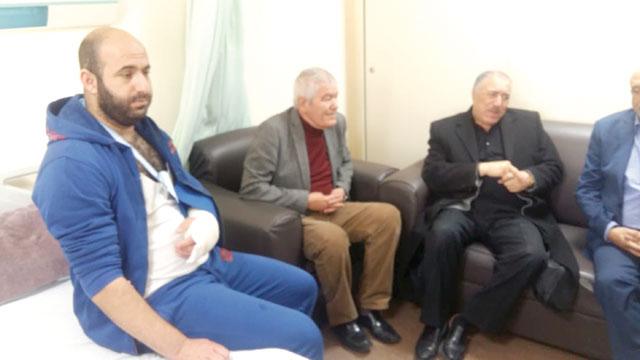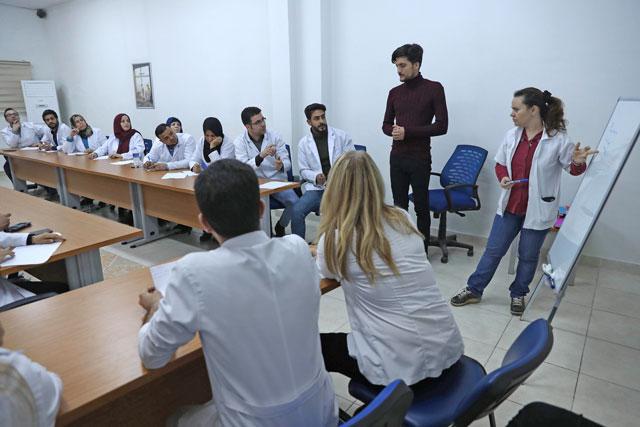You are here
Health professionals say gov’t has to ‘mitigate our pains too’
By Renad Aljadid - May 30,2018 - Last updated at May 30,2018

The medical personnel of various public and private hospitals took part in the strike against the income tax draft law in Amman on Wednesday (Photo courtesy of Zuhair Msallam)
AMMAN — Doctors, pharmacists and nurses on Wednesday took part in the nationwide strike at their respective hospitals to protest the income tax draft law and the civil service system.
The medical personnel of various public and private hospitals in Amman were seen leaving their offices and gathering in the hospitals' yards this morning, in response to the calls launched by the Kingdom's three health associations — the Jordan Medical Association (JMA), the Jordan Pharmacists Association and the Jordan Nurses and Midwives Association — earlier this week.
"The salaries are the same while prices are increasing. Meanwhile, the government is drafting and endorsing laws that only seek to earn more and more money from the poor's pockets," a nurse, who spoke under anonymity, lamented.
The health professionals were among a number of unionists and professional association members who joined Wednesday's strike demanding that the draft amendments to the Income Tax Law not be endorsed, in addition to changing employees’ performance evaluation system, describing these laws as "unjust" and "against the interests of citizens", according to a group of doctors striking at Amman Medical Centre (AMC).
"Even before these laws, our rights as health workers were already diminished and, now, with these decisions, the burden will become unbearable," Hanan Rushdi, one of the striking pharmacists, told The Jordan Times, claiming "one day is not enough and does not make a difference. There should be more escalating measures if we get no response."
"The government should stop responding to the International Monetary Fund's dictations at the expense of its citizens," another pharmacist, who preferred to remain anonymous stated, adding "our strike is peaceful and we intend no harm to our beloved country or its properties, but 'some people' are betting that the citizens will remain silent and it is now the time to speak up."
"Jordan is a limited resourced country. Yet, the people who are taking the country's resources are the same ones who endorse these laws on poor citizens," the pharmacist continued, urging for "the corrupt to be held accountable".
For her part, a female doctor said: "We are standing here for all citizens, not just for the health staff, as we demand a country that grants us our basic rights of living."
A doctor at the Islamic Hospital, a private hospital that took part in the strike, echoed similar remarks. "Citizens are already burdened with the many taxes they pay on all items and products; yet, even their incomes are coveted and the government wants to get a share of it," he said, stressing "when the poverty line in Jordan is higher than the tax exemption limit, then we have to stand out and say 'enough'."
He also referred to a recent report published earlier this week by The Economist, which ranked Amman as the most expensive city in the Arab world. "High prices, no salaries and then more and more taxes," the doctor commented.
For Ahmad Abu Ein, a doctor at Prince Hamzah Public Hospital, "the Income Tax Law will demolish the entire middle class, which eventually affects the whole country."
On the civil service system, one of the health staff said: "The evaluation system puts employees at the mercy of their direct managers' moods; so, if they decide to give a 'fair' rating to the employees for two consecutive years, they will lose their jobs."
"The civil service system makes us lose our employment security," the doctor commented.
A pharmacist noted that the civil service system had excluded the teachers following the strikes they held last month, which she cited as evidence to the "injustice" of the system, saying "if one segment was excluded, then others should be as well."
Mohammad Kofahi, a member of the JMA's strike follow-up team, told The Jordan Times that both the public and private hospitals took part in the nationwide strike, except for the emergency staff and doctors who had to deal with urgent cases, noting the patients have reacted "positively" to the movement, showing understanding.
"Even directors of some private hospitals joined their staff in the strike," he commented.
Hani Dalqamoni, a nurse at AMC, pointed out that "as health cadres, we are humans in the first place, so we delivered aid to urgent cases, including the dialysis patients. However, we are striking regarding the regular and routine cases".
"When we received a child with a high fever, five of our cadres suspended their strike and ran for help," he recalled.
"We are truly glad that our campaign has reached out to all citizens as patients are standing by our side and have cooperated with the strike," another health staff commented, stressing "we are loyal to our profession and we want to help people and mitigate their pain, but we need the government to understand our demands and mitigate our pains too."
Related Articles
PARIS — A Syrian aid group on Wednesday denounced the incessant bombing of medical facilities in the war-wracked country, where 177 hospital
AMMAN — Health Minister Ghazi Zaben on Sunday stressed that the ministry “will not be lenient” in prosecuting the perpetrators who attacked
ANKARA, Turkey — Safa Al Hussein comes into the consultation room with her four-year-old daughter, Ahed, who has a leg injury she suffered d













